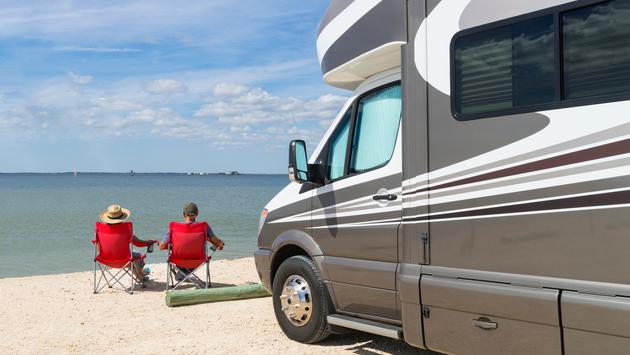RV Makers Cater Designs to ‘Work From Anywhere’ Demand Amid Pandemic

Many RV, travel trailer and camper van manufacturers are refocusing their new-model designs to cater to customers’ shifting priorities, as the COVID-19 pandemic forces people to rethink what their travel plans, work and home lives will look like.
As COVID-19 prompted international border closures and caused air travel to virtually halt, the past six months have seen road trips in personal or rented vehicles become Americans’ preferred form of travel.
The rise in remote work prompted by the pandemic, combined with cabin fever caused by stay-at-home orders, had led many to take up a “work from anywhere” lifestyle that they may never have considered before.
Stanford research revealed that 42 percent of U.S. workers are now working full-time from their homes, and that number may continue growing. They are part of the reason that the RV market has seen skyrocketing demand in recent months.
Just as internet connectivity and workspace availability have become expected of hotels and resorts, consumers now seek the same infrastructure in an RV. Makers like Bowlus Road Chief and Leisure Travel Vans are already ahead of the curve in offering remote work-friendly builds so that they need only add updates instead of overhauling floor plans.
Dean Corrigal of Leisure Travel Vans told Business Insider that between 30 and 40 percent of emails his company has received come from customers inquiring specifically about the vans’ mobile office capabilities. “It’s a huge amount of first-time buyers sending request emails to us…people that want to work from their RVs are right behind that,” Corrigal said. “I think it’s a huge growing segment, and the longer this COVID-19 thing lasts, the more the RV industry is going to go forward and push in sales.”
Several other RV manufacturers whose products were not previously optimized for the so-called “digital nomad” segment are now altering their new designs or updating previous builds to accommodate remote work. Motorhome maker Winnebago told Business Insider that this means incorporating features like improved soundproofing, quieter power systems and ergonomic seating.
“Work from home is now one of the big boxes that product development has to check when they’re considering a new product,” said Brian Hazelton, Vice President at Winnebago. Even prior to the recent boom, demand for office-style amenities was amplifying. “As we learned more about the Class B van business, we started to see those demands for connectivity,” Hazelton explained. “That customer group was really pushing us to do…a lot of those things before the COVID pandemic started.”
Major manufacturer Airstream is taking a similar tack in terms of updating existing floorplans to better accommodate remote work, according to Airstream President and CEO of Bob Wheeler. He divulged that the company had already been planning product inclusions to cater to the digital nomad trend, but that the pandemic has expedited these efforts.
“We tried to look at some of our floor plans and say, ‘Where could we carve out a dedicated work area so you don’t have to clean up your workday in order to have a meal [at the dinette table]?'” Wheeler said. In order to create desk space within an RV’s limited dimensions, the company must adjust other interior amenities, perhaps decreasing the size of dinettes or eliminating a second bed.
As of now, this option will only be available in Airstream’s Flying Cloud travel trailer, which the company hopes will be available by the end of September 2020.
“It’s not overkill,” Wheeler said. “You don’t need a five-foot-wide slab [desk] in your travel trailer, but we find that when we talk to people about the option to have this area where they can set up and leave their work set up, and still live in the rest of the trailer, that’s really appealing.”
